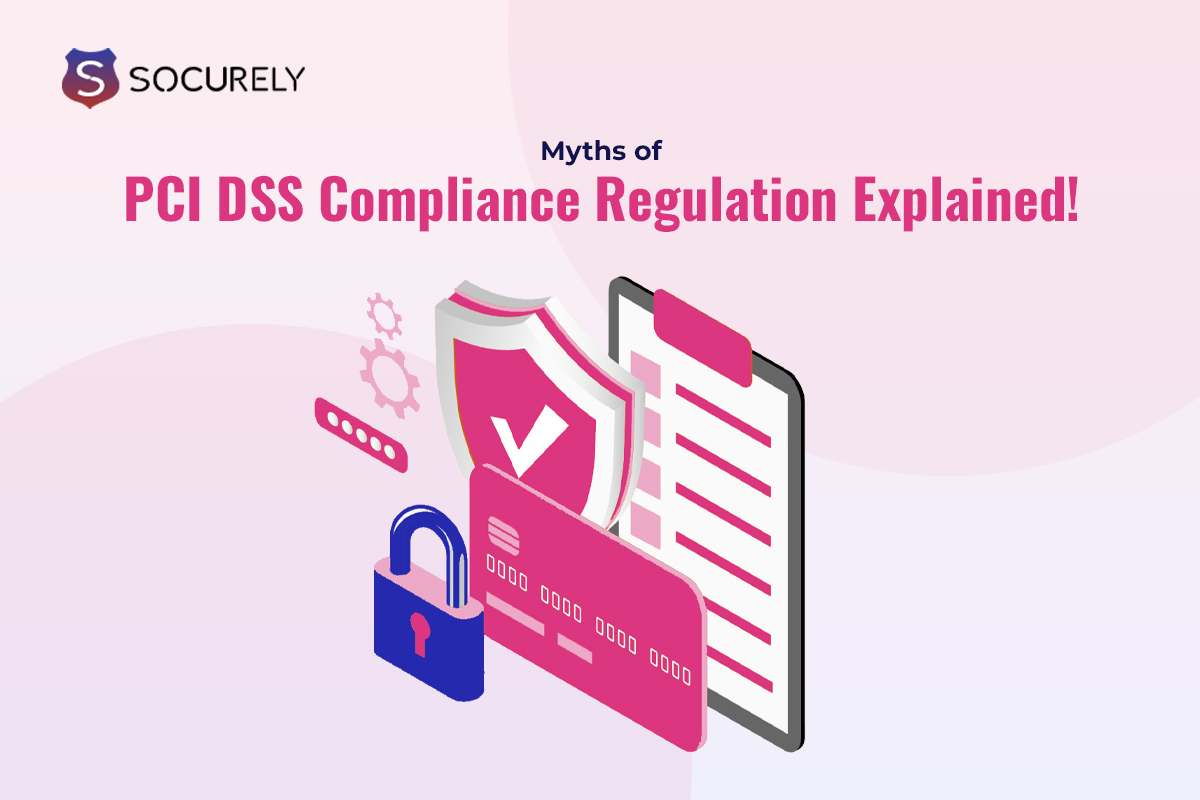Are you aware that nearly 90% of consumers want to trade with companies that have experienced a data breach? It is why, securing payment card information is more critical than ever. For businesses handling this sensitive data, compliance with the Payment Card Industry Data Security Standard (PCI DSS) is a must.
The Payment Card Industry Data Security Standard (PCI DSS) is a set of security standards designed to ensure that all companies processing, storing, or transmitting credit card information maintain a secure environment. It aims to protect cardholder data and reduce credit card fraud through a series of established requirements.
Despite its significance, many myths and misconceptions surround PCI DSS compliance. This post aims to debunk the common myths of PCI DSS Compliance and reveal the truths behind it, helping businesses understand the real value of PCI DSS Compliance.
Key Elements of PCI DSS Compliance
To make this post more engaging and informative, let’s include an infographic highlighting the key elements of PCI DSS compliance:
- Build and Maintain a Secure Network
- Protect Cardholder Data
- Maintain a Vulnerability Management Program
- Implement Strong Access Control Measures
- Regularly Monitor and Test Networks
- Maintain an Information Security Policy
Common Myths to Consider-
Myth 1: PCI DSS Do Not Apply to Small Merchants
Truth: Compliance is Required Even for One Transaction
A common misconception is that PCI DSS compliance does not apply to small merchants who process only a few transactions yearly. However, the reality is that every business, regardless of size or transaction volume, that processes, stores, or transmits payment card information must comply with PCI DSS. Even if your business processes just one credit card transaction, you need to comply with PCI DSS. While you may not require an audit, compliance with the guidelines is mandatory.
Real-Life Example
Consider a small online store that processes a few transactions each month. Despite its small scale, it experienced a data breach due to non-compliance with PCI DSS. The financial penalties and loss of customer trust were significant, underscoring the importance of compliance for all businesses.
Myth 2: PCI DSS Only Applies to E-commerce Companies
Truth: All Businesses Handling Cardholder Information Must Comply
Another prevalent myth is that PCI DSS only applies to e-commerce companies. In reality, every business that stores, processes, or transmits cardholder information must be PCI DSS compliant. Further, businesses like brick-and-mortar stores, firms using point-of-sale (POS) devices, and any organization handling card data, regardless of the medium.
Statistics
According to the PCI Security Standards Council, 71% of data breaches are linked to third-party vendors, many of which are not e-commerce businesses. This statistic highlights the broad applicability of PCI DSS across various business types.
**Also read the common myths of ISO 27001 Compliance.
Myth 3: If You’re 80% Compliant, You Don’t Need It!
Truth: Full Compliance is Mandatory
Some businesses, be it small or large believe that achieving partial compliance, such as 80%, is sufficient. Unlike other standards, PCI DSS requires full compliance with all levels, six principles, and twelve PCI DSS security standards. Partial compliance is not recognized, and failing to meet all requirements leaves the business vulnerable to data breaches and penalties.
Real-Life Example
A mid-sized retail chain achieved 80% compliance but did not implement strong access control measures. This oversight led to a data breach, resulting in significant financial losses and regulatory fines. Full compliance could have prevented this incident.
Myth 4: PCI DSS is Only About Technology
Truth: Compliance Encompasses People, Processes, and Technology
A common myth is that PCI DSS compliance is solely focused on technological measures. While technology plays a significant role, PCI DSS also involves implementing proper policies and training employees. Human error is a common cause of data breaches, making staff training and procedural adherence just as important as technological safeguards.
Real-Life Example
An organization invested heavily in technological solutions for PCI DSS compliance but neglected employee training. A phishing attack successfully compromised sensitive data due to a lack of awareness among staff. This example illustrates the need for a holistic approach to compliance.
Myth 5: Outsourcing Payment Processing Ensures Compliance
Truth: Responsibility Still Lies with the Business
Some businesses believe that outsourcing their payment processing automatically makes them compliant with PCI DSS. While third-party payment processors can help with compliance, the ultimate responsibility lies with the business. It is crucial to ensure that the chosen processor is compliant and to understand that any data breaches can still impact the business. Regularly reviewing the processor’s compliance status and maintaining internal security practices is essential.
Statistics
The PCI Security Standards Council states that 71% of data breaches are linked to third-party vendors. This statistic highlights the importance of choosing compliant partners and maintaining oversight.
Myth 6: PCI DSS Compliance is Too Expensive
Truth: The Cost of Non-Compliance is Higher
Many businesses, especially smaller ones, believe that PCI DSS compliance is prohibitively expensive. While there are costs associated with achieving and maintaining PCI DSS compliance, the cost of non-compliance can be far greater. Non-compliance can result in fines ranging from $5,000 to $100,000 per month until compliance is achieved. Additionally, the financial impact of a data breach, including legal fees, customer compensation, and reputational damage, can be catastrophic.
Real-Life Example
Consider a mid-sized e-commerce company that chose to forgo PCI DSS compliance due to perceived costs. After a data breach, they faced over $200,000 in fines and lost a significant portion of their customer base. Investing in compliance from the outset could have prevented these substantial losses.
Myth 7: PCI DSS Compliance is a One-Time Effort
Truth: PCI DSS Compliance is an Ongoing Process
Another common myth is that PCI DSS compliance is a one-time task that, once completed, no longer requires attention. However, compliance with PCI DSS is not a one-and-done deal. It requires continuous monitoring and updating of security measures. Businesses must undergo regular assessments and audits to ensure they remain compliant. This ongoing process is critical to adapting to new threats and maintaining robust security.
Example
A company achieved PCI DSS compliance but failed to perform regular security updates and audits. As a result, they fell out of compliance and became vulnerable to new threats. Continuous compliance efforts could have prevented this lapse.
Myth 8: PCI DSS is Only for Credit Card Transactions
Truth: PCI DSS Covers All Cardholder Data, Including Debit Cards
Some businesses mistakenly believe that PCI DSS only applies to credit card transactions. However, PCI DSS covers all cardholder data, including debit cards, prepaid cards, and other types of payment cards. Many debit cards can be used on credit card network segments, bringing them under the purview of PCI DSS.
Real-Life Example
A business that only processed ATM debit card transactions thought it was exempt from PCI DSS compliance. A subsequent data breach involving debit card information highlighted the importance of complying with PCI DSS for all cardholder data.
Myth 9: PCI DSS Compliance is Only About Avoiding Fines
Truth: Compliance Enhances Overall Security and Trust
While avoiding fines is a significant aspect of PCI DSS compliance, its primary goal is to enhance the overall security of cardholder data and build customer trust. Compliance demonstrates a business’s commitment to protecting sensitive information, which can enhance its reputation and customer loyalty.
Statistics
A study by the Ponemon Institute found that companies with strong security practices, including PCI DSS compliance, experienced fewer data breaches and lower costs per breach incident. This highlights the broader benefits of compliance beyond merely avoiding fines.
Myth 10: PCI DSS Compliance is a Burden Without Benefits
Truth: Compliance Provides Competitive Advantages
Some businesses view PCI DSS compliance as a burdensome requirement with no tangible benefits. In reality, compliance can provide competitive advantages. It can enhance customer confidence, reduce the risk of data breaches, and potentially lower the cost of cyber insurance premiums. Being compliant can also streamline the process of partnering with other businesses that require compliance as a prerequisite.
Example
A company that prioritized PCI DSS compliance found it easier to establish partnerships with other compliant businesses, leading to new opportunities and growth. The enhanced security measures also reduced the likelihood of costly data breaches, providing a significant return on investment.
How Socurely Can Assist Your Business
Customized Compliance Solutions
Navigating the complexities of PCI DSS compliance can be challenging, but Socurely is here to help. We offer tailored compliance solutions that cater to the specific needs of your business, ensuring that you meet all PCI DSS requirements efficiently. Our team of experts conducts thorough assessments and provides actionable insights to strengthen your security posture.
Continuous Support and Monitoring
Compliance is an ongoing process, and Socurely provides continuous support to help your business stay compliant. Our services include regular security assessments, employee training programs, and the implementation of robust security measures. We also offer 24/7 monitoring to detect and mitigate potential threats, ensuring your business remains secure and compliant.
Conclusion
Debunking these common myths about PCI DSS compliance is crucial for businesses to understand the true scope and importance of maintaining robust security measures. Compliance is not just a regulatory checkbox but a comprehensive approach involving people, processes, and technology. By dispelling these misconceptions, businesses can better protect sensitive data, avoid costly penalties, and build trust with their customers.
Understanding and embracing the truths behind PCI DSS will not only enhance security but also provide a competitive edge in today’s data-driven marketplace. Stay vigilant, stay informed, and prioritize compliance as a continuous journey towards securing your business and your customers.







